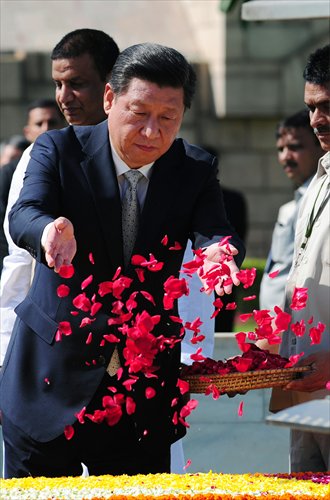Xi, Modi ink 12 agreements
China commits $20 billion investment in next 5 years

Chinese President Xi Jinping offers flower petals as he pays homage at the Mahatma Ghandi Memorial in the Indian capital New Delhi on Thursday. Photo: AFP
Chinese and Indian leaders Thursday inked a dozen agreements worth billions of dollars to the sub-continent and pledged to solve border disputes, even as troops from both sides are involved in a standoff in the disputed zone.
Chinese President Xi Jinping arrived in New Delhi late Wednesday after a stop in Gujarat, and was welcomed Thursday morning by Indian President Pranab Mukherjee and Prime Minister Narendra Modi with full honors.
Talks between Xi and Modi at the historic Hyderbad House lasted 90 minutes, longer than expected.
The two leaders later told reporters that 12 agreements were inked. This includes a Chinese commitment to invest $20 billion in India in the next five years, said Modi, who added that the two sides will begin discussions on civil nuclear energy cooperation.
Xi announced China will establish two industrial parks in Gujarat and Maharashtra states to produce power transmission equipment and auto parts. China will help raise the speed of the Chennai-Bangalore-Mysore railway line, upgrade railway stations and develop high-speed railways in India.
The Chinese president also said China is willing to give more market access to imported Indian pharmaceutical and agricultural products as well as films to narrow the trade deficit.
India's trade deficit reached $31.4 billion against China in 2013, according to Chinese government data.
Other pacts include cultural exchanges, peaceful use of space and a twin city arrangement for Shanghai and Mumbai, New Delhi Television (NDTV) reported.
Chinese firms have in the past complained of restrictions on investment in India, which Chinese analysts concluded were due to India politicizing economic issues.
Labeled a reformist and business-friendly, Modi is expected to foster a more favorable market environment.
"India will be more open to China and Chinese investment companies. In fact, Modi's leadership is a kind of leadership where he pushes forward economic means as a channel for diplomacy," said Jagannath Panda, a research fellow and center coordinator for East Asia at the New Delhi-based Institute for Defense Studies and Analyses. "You will see a new India emerging and opening to the rest of the world and in that China will be placed in a higher order."
The two leaders also touched upon more sensitive issues, such as tensions over the disputed border.
Since September 10, troops from both sides of the Line of Actual Control (LAC) have faced-off over alleged disputes on road construction, reported Indian media.
According to NDTV, a flag meeting called by China took place on Monday but ended fruitless. A fresh standoff occurred in the early hours of Thursday, bringing the number of troops involved to 1,000 from each side.
Modi reportedly raised concerns over the ongoing incident to Xi during their stopover in Gujarat Wednesday, and it was brought up again during Thursday's talks.
Xi told reporters Thursday that the border dispute is a leftover historical issue, and that as the border is not yet demarcated, there are occasional incidents. He noted the two countries are capable of effectively managing the border situation.
"China is determined to work with India to settle the boundary issue at an early date through friendly negotiations," Xi said.
Modi said the two countries need to resolve the border dispute quickly and clarify the LAC for peace and stability.
An observer specializing in South Asian studies, who asked for anonymity, said that prior to visits to India by Chinese leaders, tensions often ramp up near the border.
Last year, ahead of Premier Li Keqiang's India visit, there was a three-week standoff in the western part of the border.
Noting it may not be a coincidence, the observer said some forces in India might want to exert pressure on China over the meeting's agenda. "They don't want the talks to only focus on trade and economic cooperation, and might want to use it as leverage to press for talks over the border issue."
Hu Zhiyong, a research fellow with the Institute of International Relations at the Shanghai Academy of Social Sciences, said that Modi has taken a hard line on political and security policies, reinforcing infrastructure on the Indian side of the LAC and upgrading equipment. "The 'offensive' strategy aims to gain more leverage in the talks," said Hu.
The anonymous observer noted that she doesn't see much chance of a settlement of the border issue under Modi and Xi's regimes.
"Indians have long regarded themselves victims in the border dispute [following the brief war with China in 1962]. It remains in doubt whether Modi will make concessions," she said.
For China, while settling the dispute may alleviate concerns that India will side with Japan and the US, it still won't be a strong enough incentive for concessions, said the observer. "It is not a border dispute alone, as it is intertwined with the Tibet question."
The Dalai Lama Thursday said in Mumbai that "Tibet's problem is India's problem."
Modi reiterated India will not allow Tibetans to conduct anti-China political activities in the country. He also reaffirmed that Tibet is a part of China, the Xinhua News Agency reported.